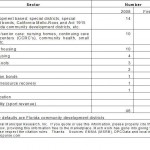Municipal bond defaults over the last two years occur in sectors that tie into the financial crisis: real estate. Multi-family housing and land development projects that never took off are at the front line. Special entities – usually a district of some kind, depending on the state – sell tax-exempt bonds to finance infrastructure for real estate development projects. These are mostly non-rated securities. Many of the securities were sold during the go-go development years of 2001-2007.
A stark increase in defaults among Florida “community development districts” took place in 2008-2009. These are primarily single family subdivisions across the state and many remain in their dirt stage of development. “CDD’s” as they are called, rely on special assessments paid by the land-owners. (The owner is assessed based on the “benefit” received from the infrastructure – rather than a property tax based on the value of the property.) The land-owners in early stage districts are essentially the developers. Some of them today are bankrupt and unable to pay the assessments.
In Florida, defaulted properties become part of the tax lien market where individual investors who believed in the prospects of a project could pay off the tax liens and reap high returns on the investment. With the bursting of the housing bubble, these markets have softened and a traditional source of liquidity that kept this market going has dried up.
The other state where land development defaults are showing up is California. There the defaults are in “Mello-Roos” districts, which may be part of a school district or city. A special tax is charged to land owners located within a Community Facilities District.
Elsewhere, commercial real estate troubles are beginning to show up in debt service reserve withdrawals in sectors such as transportation development districts in Missouri and Arkansas. These are sales taxes or tax increment bonds that funded infrastructure for a small retail, or commercial real estate development. Some of these retail establishments never got off the ground. Again, the common pattern is issuance of bonds during the last five years.
For some reason, Texas, which has many special districts for land development (known as “MUDS”), are not appearing on the default screen at this time. Rather, multi-family housing –defaults are clustered in Texas, while the special district (single family developments) are mostly clustered in Florida and in California. (your thoughts?)
Notable other defaults include repeat headline grabbers: the Las Vegas Monorail, the Connector 2000 toll road in South Carolina and Jefferson County, Alabama sewer system.
We break down the default data into the following general sectors. (Note that debt service reserve draws are not included here.)
